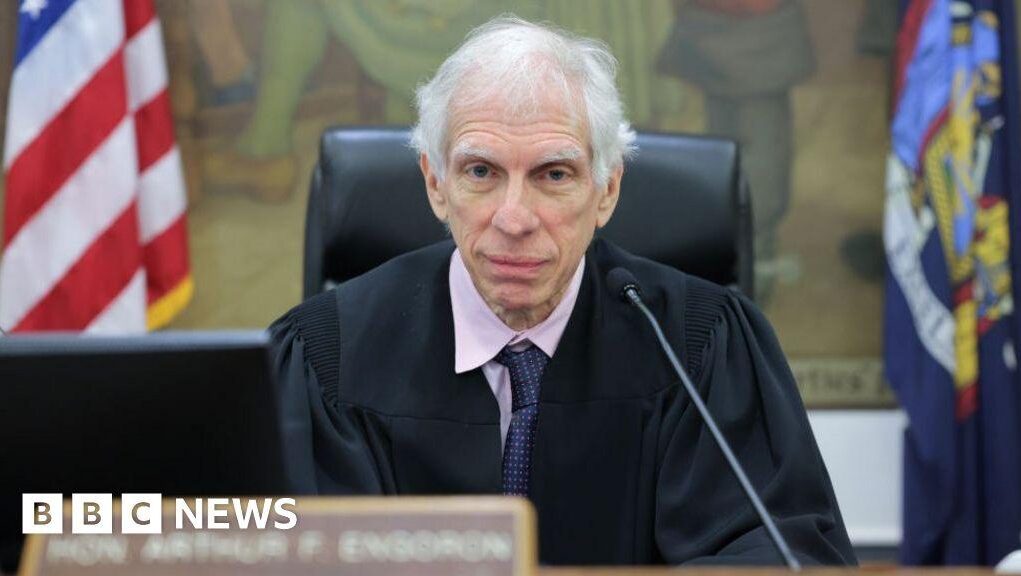As he took the stand on Monday in a nondescript New York courtroom, Donald Trump will have locked eyes with Arthur Engoron, the 74-year old judge who holds the future of his real estate empire in his hands.
His family business has already been found liable for fraud, and now the judge, not a jury, must decide whether to impose penalties such as a fine of up to $250m (£202m) and restrictions on his ability to do business in the state.
Despite Judge Engoron’s critical role, Mr Trump was combative on the stand. He took direct aim at the judge, leading to some heated exchanges, and drew his rebukes for airing broad grievances when they were not directly relevant to the question.
All of this appeared to irritate the judge who will, ultimately, decide on any penalties.
“It does seem completely counterintuitive. Especially when the judge is going to be the finder of fact and law,” Kevin McMunigal, a former federal prosecutor and professor of criminal law at Case Western University, told the BBC.
“There are only two explanations,” he said. “One is Trump just can’t control himself. Or two: Maybe this is something he has thought out.”
So if Mr Trump’s team has adopted this antagonistic approach as a deliberate strategy, what could the goal be?
“I think he is trying to goad the judge into doing something he can argue on appeal shows prejudice on his part,” Prof McMunigal said. “Maybe he makes a comment they can use to support a bias case later.”
Mr Trump’s lawyers are widely expected to file an appeal, and his team have also discussed a potential mistrial motion that will seemingly reference communications between the judge and his law clerk who they have accused of bias.
With potential arguments around this in mind, it was notable that Judge Engoron rarely engaged when Mr Trump attacked him directly on Monday.
This video can not be played
Watch: Trump testifies in his fraud trial… in 85 seconds
Throughout the trial Mr Trump has sought to frame the lawsuit as a politically motivated “witch-hunt”. He has referred to Judge Engoron and New York Attorney General Letitia James, both Democrats, as corrupt and rogue officials.
And his legal team has tried to follow similar tactics in court. As well as denying wrongdoing and defending his business practices, Mr Trump accused the judge of being “very hostile” and said he “always rules against me”.
But Prof McMunigal noted that targeting the judge in this way was generally the last resort when a legal team believed they had no other option.
“Its usually a tactic nobody wants to do because the judge has so much discretionary power in the case,” he said.
Renato Mariotti, a former federal prosecutor, agreed. He told the BBC that Mr Trump’s combative responses indicated that his legal team believed “they’ve already lost”.
He said it would be a safer strategy for Mr Trump to invoke his right under the Fifth Amendment of the US Constitution and decline to answer questions.
“He’s focused on provoking a fight with the judge,” he said. “None of that helps, from a legal perspective.”
Other analysts and legal experts noted that aside from being risky, the performance in the stand could open Mr Trump up to charges of contempt of court.
Mitchell Epner, a former federal prosecutor, spoke to the BBC after a particularly heated period of testimony. The judge urged the former president’s lawyers to control him and threatened to throw him out of court if they did not.
Mr Epner said Judge Engoron could have taken action and charged him for his behaviour at that stage.
“I would not be surprised if the starting point for fines was $100,000 or something even higher,” he said. “Whatever the judge does, it’s going to be designed to compel Trump to stop acting in the way he’s been acting”.
The remainder of the testimony, however, was more subdued and both the judge and Mr Trump were notably less animated.
Carl Tobias, a law professor at the University of Richmond, told the BBC that Mr Trump, the frontrunner for the Republican presidential nomination, appeared to view the trial as an opportunity to campaign.
“[His] behaviour suggests that he may view the trial as an opportunity to play the victim of an unfair justice system and, thus, attempt to capitalise on the trial to score political points,” Professor Tobias said.
He added that Trump “may also be hoping to win on appeal” and has already appealed Judge Engoron’s original finding of fraud.
Leslie Caldwell, a former US district attorney, observed that the persecution argument appeared to “resonate with many people”.
“I think he is trying to portray himself as a victim of an unfair prosecution,” she said.
The 45th president has sought to capitalise on his legal troubles to great effect in the past.
His presidential campaign raised more than $4m in just 24-hours after his mugshot was released by prosecutors in Georgia in August.
And consistent legal challenges have only seen his lead in opinion polls over Republican challengers increase.
(With additional reporting from Bernd Debusmann Jr)
Trump clashes repeatedly with judge in NY hearing
The glitzy New York buildings that Trump could lose
Four surprises that could upend the 2024 US election









